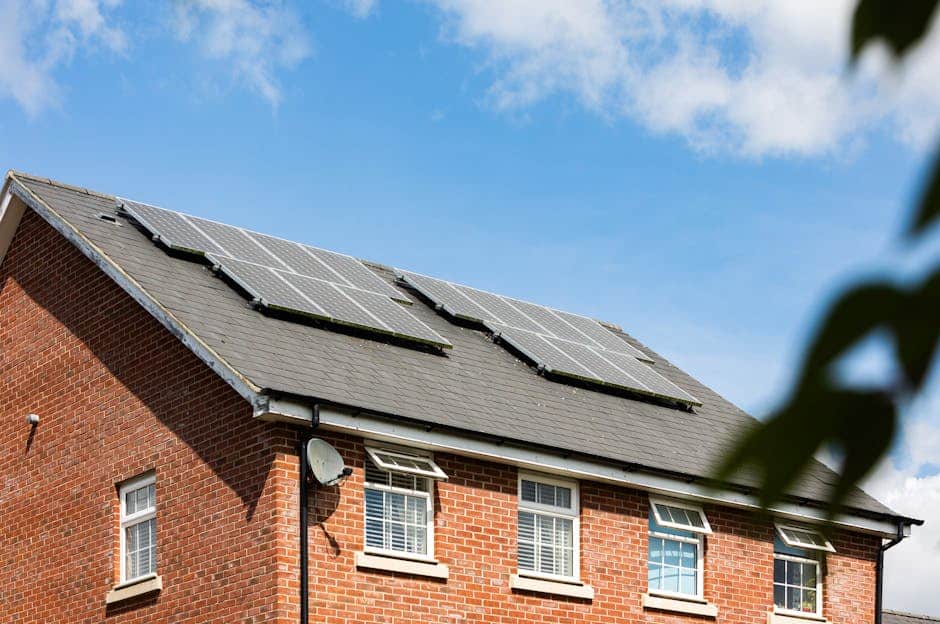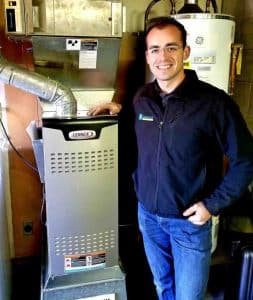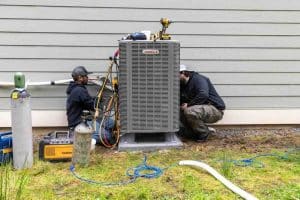When it comes to keeping your home comfortable and your energy bills low, rebates for HVAC upgrades can be a game-changer. These financial incentives make it easier and more affordable for homeowners in Whatcom, Skagit, and Snohomish County to invest in energy-efficient HVAC systems. Here’s what you need to know about these rebates:
- Rebate Amounts: Up to $1,500 available for top-tier systems like Geothermal Heat Pumps.
- Eligible Projects: Air Source Heat Pumps, Duct Sealing, Attic Insulation, and more.
- Financial Benefits: Reduce your monthly energy bill and potentially qualify for federal tax credits too.
Improving energy efficiency in your home not only means fewer dollars spent on heating and cooling but also contributes to a more sustainable future. With tax credits and rebates on the table, now is the perfect time to upgrade your HVAC system.
I’m Colin Matei, and as the President of Clean Air Heating & Cooling, my goal is to help our community make the most of rebates for HVAC upgrades. With years of expertise in maximizing energy efficiency, I am committed to providing information that improves your comfort and well-being.

Quick rebates for HVAC upgrades terms:
– Cascade Natural Gas rebates
– Washington State heating rebates
Understanding HVAC Upgrade Rebates
When you upgrade your HVAC system, you not only improve your home’s comfort but also tap into a range of financial benefits. Rebates for HVAC upgrades can significantly reduce the cost of these improvements. Let’s explore the types of rebates available and the criteria you need to meet to qualify.
Types of HVAC Rebates
Homeowners have several options when it comes to HVAC rebates. These rebates are designed to encourage energy-efficient upgrades that not only cut costs but also reduce carbon footprints.
- Heat Pumps: These systems are highly efficient and can earn you rebates up to $1,500 per system. Whether you opt for a Geothermal or Air Source Heat Pump, the savings are substantial.
- Central Air Conditioners: If you’re considering a central air conditioning system, you can receive rebates ranging from $250 to $400, depending on the system’s efficiency rating (SEER2).
- Biomass Stoves and Boilers: These are lesser-known options but can also qualify for rebates as they contribute to energy efficiency by using renewable resources.
Eligibility Criteria for Rebates
To make the most of these rebates, certain eligibility criteria must be met:
- Income Limits: Some rebate programs, like the High-Efficiency Electric Home Rebate, are income-based. For instance, families earning less than 150% of the area’s median income may qualify for more substantial rebates.
- Primary Residence: The upgrades must be made to your primary residence to qualify for most rebates and tax credits. This means the home where you live most of the time.
- Existing Homes: Generally, rebates and tax credits are available for existing homes, not new constructions. This is to encourage the retrofitting of older systems to more energy-efficient standards.
- IRS Form 5695: To claim federal tax credits for your energy-efficient HVAC upgrades, you’ll need to file IRS Form 5695 with your tax return. This form captures the details of your energy improvements and helps you claim the credits you’re entitled to.

Understanding these rebates and eligibility criteria can help you plan your HVAC upgrades more effectively, maximizing both your savings and your home’s energy efficiency.
Federal Tax Credits for HVAC Upgrades
When it comes to upgrading your HVAC system, federal tax credits can be a game-changer. Thanks to the Inflation Reduction Act, homeowners can now save significantly on energy-efficient home improvements. Let’s explore how these credits work for heat pumps and central air conditioners.
Heat Pump Tax Credits
Heat pumps are a smart choice for those looking to improve their home’s energy efficiency. Under the Inflation Reduction Act, you can claim a 30% tax credit on the cost of installing a heat pump, up to a maximum of $2,000. This credit applies to both air source and geothermal heat pumps, making them an attractive option for those looking to reduce their carbon footprint and utility bills.
Heat pumps are known for their efficiency because they transfer heat rather than generate it, making them three to five times more efficient than traditional systems. They provide both heating and cooling, so they’re a versatile addition to any home.
Central Air Conditioner Tax Credits
Upgrading to an energy-efficient central air conditioner not only improves comfort but also offers financial rewards. If you install an ENERGY STAR certified central air conditioner with a SEER rating of 16 or higher, you can qualify for a tax credit of 30% of the project cost, up to $600.
This tax credit is designed to encourage homeowners to choose systems that meet or exceed the highest efficiency standards set by the Consortium for Energy Efficiency. By opting for a high-efficiency central air conditioner, you not only reduce your energy bills but also contribute to a greener environment.
These federal tax credits provide a fantastic opportunity to save money while making your home more energy-efficient. By understanding these credits and planning your upgrades strategically, you can maximize your savings and enjoy a more comfortable living environment.
State and Local HVAC Rebates
When considering rebates for HVAC upgrades, don’t overlook the opportunities available through state and local programs. These incentives can significantly reduce the cost of your energy-efficient home improvements.
Washington State HVAC Rebates
In Washington, homeowners can tap into various state programs and utility rebates to improve their HVAC systems. Washington offers rebates for energy-efficient upgrades, such as heat pumps and central air conditioners, helping residents save on their energy bills.
Clean Air Heating & Cooling is a notable provider in Washington state, offering utility rebates that align with state programs. These rebates can cover a portion of your upgrade costs, making it more affordable to switch to energy-efficient systems.
For instance, Washington state utilities often provide incentives for installing heat pumps, which are known for their high efficiency and dual functionality in heating and cooling. By choosing Clean Air Heating & Cooling, you not only benefit from expert installation but also gain access to these valuable rebates.
How to Find Local Rebates
Finding local rebates for HVAC upgrades is easier than you might think. Start by checking with your utility company, as they often have programs in place to encourage energy efficiency. Utility companies sometimes offer rebates for specific products like ENERGY STAR certified equipment.
Another great resource is the ENERGY STAR Rebate Finder, which helps you locate utility, state, and local rebates in your area. This tool is invaluable for identifying available incentives and ensuring you maximize your savings.
When planning your upgrades, consider combining state and local rebates with federal tax credits. This strategy can further improve your savings, making energy-efficient home improvements more accessible. By leveraging these resources, you can make informed decisions and achieve a more sustainable and cost-effective home environment.
Strategies to Maximize Your HVAC Upgrade Savings
When considering rebates for HVAC upgrades, a strategic approach can help you maximize your savings. By planning your upgrades over time and combining different types of credits and rebates, you can significantly reduce costs.
Combining Insulation and HVAC Upgrades
One effective strategy is to pair insulation improvements with your HVAC upgrades. Before installing a new heat pump or central air conditioner, consider conducting a home energy audit. An audit can reveal areas where your home loses energy, like insufficient attic insulation or air leaks.
By addressing these issues first, you can improve the efficiency of your new HVAC system. For example, optimizing your attic insulation can cut down on energy waste, making your heating and cooling systems more effective. According to energy-saving experts, “Individually, you could claim 30% of the product cost of the insulation, up to $1,200.”

Upgrading Heating and Cooling Systems
When it comes to upgrading your heating and cooling systems, timing and choice of equipment are key. Spreading your improvements over several years can help you stay within annual credit limits and maximize the benefits. For instance, you might start with installing a heat pump, which can qualify for a $2,000 federal tax credit under the Inflation Reduction Act.
Central air conditioners are another great option. If they meet ENERGY STAR certification, you could claim a $600 tax credit. By planning these upgrades in stages, you can ensure each installation is eligible for the maximum available rebates and credits.
Clean Air Heating & Cooling offers expert advice and installation services, ensuring your upgrades are eligible for both state and federal incentives. By choosing energy-efficient systems, you not only gain immediate savings through rebates but also enjoy long-term reductions on your energy bills.
The key to maximizing your savings is to combine different credits and rebates. Federal tax credits can often be paired with state and local incentives, creating a significant reduction in your overall costs. By carefully planning your upgrades and taking advantage of available resources, you can make your home more energy-efficient and cost-effective.
Frequently Asked Questions about Rebates for HVAC Upgrades
What HVAC Systems Qualify for Tax Credits in 2024?
If you’re planning to upgrade your HVAC system in 2024, certain systems qualify for federal tax credits. Notably, heat pumps, central air conditioners, and biomass stoves are eligible. To qualify, these systems must meet specific energy-efficiency standards, such as ENERGY STAR certification for central air conditioners. This certification ensures the system is efficient enough to meet the requirements for a $600 tax credit.
Heat pumps, on the other hand, could net you a $2,000 credit under the Inflation Reduction Act, provided they meet the necessary efficiency criteria. Always ensure that the equipment you choose meets or exceeds the standards set by the Consortium for Energy Efficiency to be eligible for these credits.
How Do I Claim HVAC Upgrade Rebates?
Claiming your rebates for HVAC upgrades involves a few steps. The primary form you’ll need is the IRS Form 5695, which is used to apply for Residential Energy Credits. Fill out this form when you file your taxes for the year in which you installed the system. Make sure to keep all relevant documentation, like receipts and installation certifications, as proof of your eligible upgrades.
You can only claim the credit for the tax year when the equipment was installed, not purchased. So, even if you bought your HVAC system in 2023 but installed it in 2024, you would claim the credit on your 2024 tax return.
Can I Combine Federal and State Rebates?
Yes, you can combine federal tax credits with state and local incentives to maximize your savings. While federal credits offer a substantial reduction, state incentives can further decrease your out-of-pocket costs. Each state has its own programs and eligibility criteria, so research what’s available in your area.
For instance, Washington state offers various utility rebates that can be paired with federal credits, making upgrades more affordable. By stacking these benefits, you could significantly reduce the overall cost of your HVAC improvements.
Clean Air Heating & Cooling can guide you through the process, ensuring you take full advantage of all available rebates and credits. By combining these savings, you not only cut down on initial costs but also enjoy long-term reductions in your energy bills.
Conclusion
At Clean Air Heating & Cooling, we are committed to helping you maximize savings through strategic HVAC upgrades. By taking advantage of available rebates for HVAC upgrades, you can significantly reduce the cost of improving your home’s energy efficiency.
Our team is dedicated to ensuring customer satisfaction by providing high-quality service and guidance throughout the rebate process. We understand that navigating through various federal, state, and local incentives can be overwhelming. That’s why we offer personalized support to help you identify and apply for all applicable rebates and tax credits.
By upgrading to energy-efficient systems like heat pumps and central air conditioners, you not only qualify for substantial tax credits but also enjoy reduced energy bills. Our 25% utility savings guarantee ensures that your investment translates into tangible savings over time. With over 480 5-star Google reviews, our focus remains on delivering prompt and reliable service to homes in Bellingham, WA, and surrounding counties.
Partnering with Clean Air Heating & Cooling means you’re not just investing in your comfort but also contributing to a more sustainable future. Let us help you steer the complexities of HVAC rebates and maximize your savings. For more information about our services, visit our furnace service page.
Together, we can make your home more energy-efficient, comfortable, and cost-effective.





